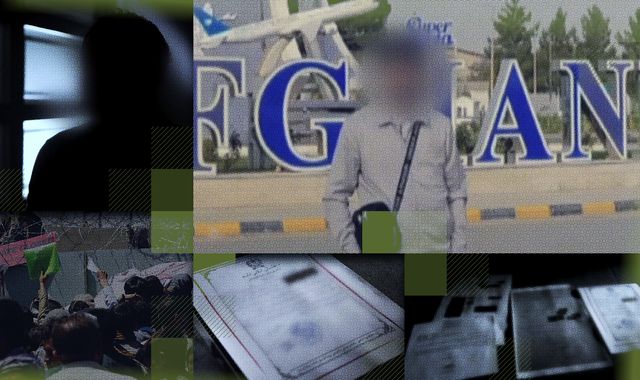The source, himself a former interpreter who served with British forces in Afghanistan before also starting a new life in the UK, said the excursions were evidence that the threat some of his countrymen say they face because of past links with the British has been exaggerated.
“The only threat is unemployment,” the man told Sky News, requesting anonymity to avoid repercussions for speaking out.
The source has direct knowledge of how the previous Conservative government processed applications for resettlement to the UK in the chaos that followed the Taliban’s return to power four years ago.
He alleged that the Afghanistan Relocations and Assistance Policy (ARAP) – which is under intense parliamentary scrutiny following revelations in July about a major data breach – had been open to exploitation by Afghans simply seeking a better life in Britain.
He said examples of this alleged exploitation included:
- Multiple cases of applicants sending British officials allegedly fake Taliban threat letters, staged “torture” videos and false claims of Taliban attacks against themselves or close relatives as evidence of the danger they were in
- Afghans being resettled in the UK despite already being granted asylum in other safe countries such as Denmark or Belgium
- Individuals being accepted for relocation even though they only worked for one or two days as interpreters with British forces
- Applicants pushing to bring in large, extended families as well as their spouse and children. This included parents, siblings, nephews, nieces and even second wives
Under the government’s scheme, an individual who is granted relocation is allowed to bring his or her spouse and any of their dependent children under the age of 18.
However, the source said that he was aware of cases where applicants falsely claimed their sons or daughters were under 18, whereas they were in their 20s.
“Now they are going to college with UK kids who are very much younger than them, which is worrying to the community and a risk to British culture,” he said.
Holidays back in Afghanistan
Successive governments since 2010 have used a variety of different routes to relocate some 35,000 Afghans – applicants and family members – to the UK. More are still scheduled to arrive, though no new applications are being accepted.
The Ministry of Defence expects the total cost to be between £5.5bn and £6bn.
Britain’s first resettlement scheme – the “intimidation policy” – was set up to help those facing serious threats from the Taliban because of their links to British forces.
An additional programme not based on threat was established in 2012 for individuals such as interpreters who had worked in dangerous roles with British soldiers for at least a year.
Criteria for eligibility were expanded further in 2021 amid fears about the impact of growing instability as the Taliban surged back into government.
Yet, four years on, the Afghan source said he is aware of Afghans who have been resettled in the UK but who have travelled back and forth to Afghanistan for holidays and other trips.
“We have witnessed … interpreters from various units, from SF [special forces] units …there are hundreds of them going in, coming back,” he said.
“It made me disappointed because [British] people believed there was a high threat to the interpreters.”
Sky News contacted one former interpreter by phone who is living in Britain after he shared images on his social media account of himself back in Afghanistan in the early summer.
Now on British soil again, he claimed he had made the trip to his home country in secret and in great fear to accompany his mother to her brother’s funeral.
However, when asked why he had openly tagged his whereabouts – including a picture of him outside Kabul airport and enjoying a picnic outside the capital as well as footage of a group of men in swimming shorts diving into a pool – he claimed these images could not be viewed by anyone in Afghanistan.
After ending the call, the former interpreter blocked his number. He subsequently made the pictures and videos on his Facebook page private.
They had previously been public.
Fake Taliban threat letters ‘huge business’
Many applications for resettlement were processed by a team of civil servants, military personnel and contractors that was based at the UK’s Permanent Joint Headquarters in Northwood in the summer of 2021 before it was moved to the Ministry of Defence (MoD).
At one point, the team had more than 100,000 cases waiting to be dealt with, according to a British source with direct knowledge of the relocation effort.
Each file contained information about an applicant, including evidence of any threat they said they faced.
If deemed credible, it made a person’s application a higher priority.
But the Afghan source said this evidence often appeared to be fake.
Examples included one man who borrowed a neighbour’s gun, then shot his own car and pretended the Taliban had done it; a second man who sent a video that he said was of his wife being beaten by the Taliban only for it to be an unrelated video taken from the Internet; and a third man who sent a photo of his dead cousin, saying he had been killed by the Taliban only for it to transpire that he had died in a car accident.
The British source, as well as a third source also with direct knowledge of the effort to process applications, said they too had seen multiple cases of phoney threats.
The Afghan source claimed there had been a thriving business in Afghanistan to produce fake Taliban threat letters.
“This is very traditional, making fake intimidation letters, fake documents… to make legitimate [an applicant’s] pathway to come to the United Kingdom,” he said.
He connected Sky News by phone with a man in Afghanistan who said he had knowledge of the fake threat letter business.
The man agreed to speak anonymously.
“It was typical threat letters, threatening people, for example, [we] will kill you and scare them, depending on the cases,” he said.
“It was a huge business, with thousands of them. Lots of these letters were made,” he said. He said it would cost between $1,000 (£740) and $1,500 (£1,110) to order a fake letter.
Asked why someone would want one, he said: “For various purposes, such as claiming asylum or moving out of the country.”
He claimed the Taliban has now cracked down on the practice, however.
The Afghan source said he did not believe the Taliban would specifically hunt down someone because they had once worked as a shopkeeper or even an interpreter on a British base more than a decade ago.
Instead, he said any killings – which do take place under the Taliban’s hardline Islamist rule – were far more likely to be related to tribal disputes, personal vendettas or other factors.
Data leak is a ‘waste of time’
Yet an accidental leak of data by a military official involving the names of nearly 19,000 people who had been applying for relocation to the UK sparked new concerns within the MoD that lives may have been put at risk.
It led to the previous government opening a secret resettlement route to the UK for thousands of impacted individuals who would not otherwise have been eligible for help.
Details about the data breach – which happened back in 2022 but was only identified in 2023 – were only revealed in July following the lifting of extraordinary legal restrictions that had prevented any reporting of the incident.
The easing of secrecy was in part enabled by the findings of an independent review commissioned by the Ministry of Defence that also played down the risk of Taliban reprisals based on a person’s previous links to the British government.
Instead, the review found that resistance to current Taliban rule “is likely to be a far more persuasive factor in the threat faced by individuals in Afghanistan”.
The Afghan source agreed.
The “data leak is a waste of time, intimidation is fake, and threat letters are fake, there is no security risk”, he said.
“That’s why I’m calling it out to stop the Afghan relocations.”
He said the money spent on resettling Afghans would be much better spent on rebuilding the British armed forces.
Read more from Sky News:
Moving Afghan nationals to UK forecast to cost more than £2bn
Thousands more Afghans affected by second data breach
‘I am very scared’
Sky News got in touch another former interpreter by phone.
This man also worked with British soldiers when they were deployed to Helmand province more than a decade ago, but he claims to have been unfairly sacked.
He has yet to be offered relocation to the UK even though his name was caught up in the data leak.
The man said the breach had put him and his family at even greater risk.
“I am very scared of the situation,” he said, speaking from Kabul in late July.
He said he was unable to go out in public, having been forced a few days earlier back to Afghanistan from Iran where he said he had been in hiding.
He was speaking while travelling in the back of a car at night with one of his children on his lap and some of his belongings next to him.
“I can’t walk freely in public safe…It’s dangerous for me,” he said.
However, his public Facebook profile appears to show him working for a company in the capital, with photographs of him posted by his boss at a corporate event on 1 July.
Other pictures show him on company business in another province last December.
When asked about his Facebook profile, the man said: “Someone is using my ID. I don’t have access to that Facebook.”
Asked whether he was saying the posts were fake, he said: “I already said that. I don’t have access to that Facebook unfortunately. I’m not using that account anymore.”
He subsequently asked to end the call and said he would phone back in a few minutes. However, he then said he was unable to make that call.
When sent follow-up questions by text message to clarify how he could claim to be in hiding when photographs and videos have been posted of him on Facebook at a corporate event in Kabul, he responded by saying “You are [sic] claimed that I am safe see this.”
He then sent links to some news articles, including one about the danger posed to Afghans affected by the data breach.
Rafi Hottak, another former interpreter who served with British forces in Afghanistan, strongly disputes claims that the Taliban is not a threat to those with links to the British.
Mr Hottak has lived in the UK since 2011 and is a leading campaigner advocating on behalf of those interpreters as well as members of elite Afghan security units who worked with British special forces – known as the Triples – who have yet to be resettled.
In a statement, he said: “The threat is immediate, severe, and constant. The Taliban view anyone who worked with foreign forces as a traitor. Many live in hiding, moving from place to place, unable to work or live openly. Arrests, beatings, and executions happen regularly.”
An MoD spokesperson said: “We are commitment to honouring the moral obligation we owe to those Afghans who stood with our brave men and women.
“As with all those arriving to the UK, anyone found eligible for relocation from Afghanistan and their family members undergo robust security checks, including for national security. If they don’t pass these checks, they are not granted entry to the UK.”
After the MoD’s independent review was concluded this year, the UK reduced the number of immediate family members eligible for relocation to three from seven.
But the British source with knowledge of the resettlement process alleged that the system had previously been “severely abused” in 2021 and early 2022 “with multiple family members being moved” to the UK. This included – on occasion – second wives, he said.
“Everyone who was approved should have their case re-looked at and assessed against a strict criteria, if found not eligible they should be taken back home along with all additional family members,” he told Sky News, before adding: “But that is never going to happen.”
Additional reporting by Jack Taylor and Katy Scholes






























